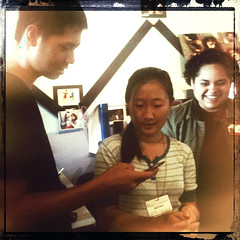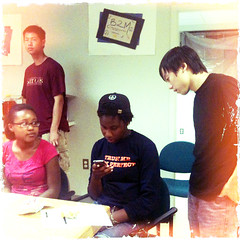
Through the Center’s Department of Play and the Comparative Media Studies department, I’ve been working with a team of people to launch Aago, a mobile app for Apple devices focusing on media creation, organization and sharing. Targeted to teens, the app aims to help them document group or individual creative projects (filmmaking, tech or art projects, citizen journalism) by creating “stories” made up of mobile photos, videos, and audio clips, which can then be arranged and exported to the web. Later features include collaborative production both on the app and on the web, where users can create and curate content with select peers or facilitators.
 Aago (a phonetic deviation of “hago”, Spanish for “I make”), was conceived by a team of UROPs under the direction of Nitin Sawhney. Starting in Spring of 2011, students spent a semester planning and iterating app function and design. This included observation studies with MIT students, investigating their creative processes on class projects, and getting their feedback on paper prototypes of Aago.
Aago (a phonetic deviation of “hago”, Spanish for “I make”), was conceived by a team of UROPs under the direction of Nitin Sawhney. Starting in Spring of 2011, students spent a semester planning and iterating app function and design. This included observation studies with MIT students, investigating their creative processes on class projects, and getting their feedback on paper prototypes of Aago.
 Over the summer, the group has focused on developing and testing a working prototype of the app. We have connected with youth from community organizations to participate in field and lab tests evaluating preliminary features. Working with a group of teens from a summer program at Google, high schoolers at the Museum of Science Computer Clubhouse, and girls from the Codman Square Neighborhood Development Corp., we’ve received critical feedback on app functionality, UI design, and proposed use cases.
Over the summer, the group has focused on developing and testing a working prototype of the app. We have connected with youth from community organizations to participate in field and lab tests evaluating preliminary features. Working with a group of teens from a summer program at Google, high schoolers at the Museum of Science Computer Clubhouse, and girls from the Codman Square Neighborhood Development Corp., we’ve received critical feedback on app functionality, UI design, and proposed use cases.
With the goal of refining Aago by the end of summer, we hope to use the fall term to foster longer partnerships with community organizations, enabling youth participants to use the devices during their own projects as a pilot case study. Stay tuned for further updates!
Aago team members include Nitin Sawhney, Lorraine Shim, Audubon Dougherty, Phu Nguyen, Edwin Zhang, Jason Hu, and Rogelio Lopez, with additional oversight from Jim Paradis.
